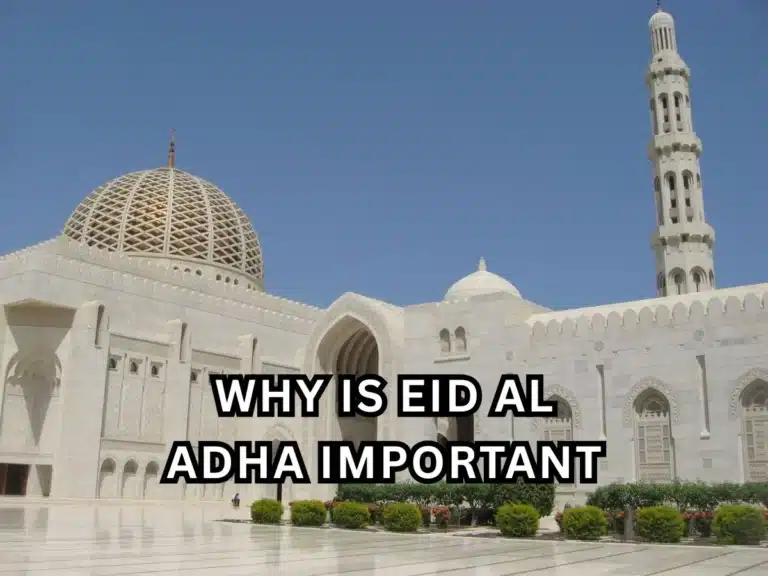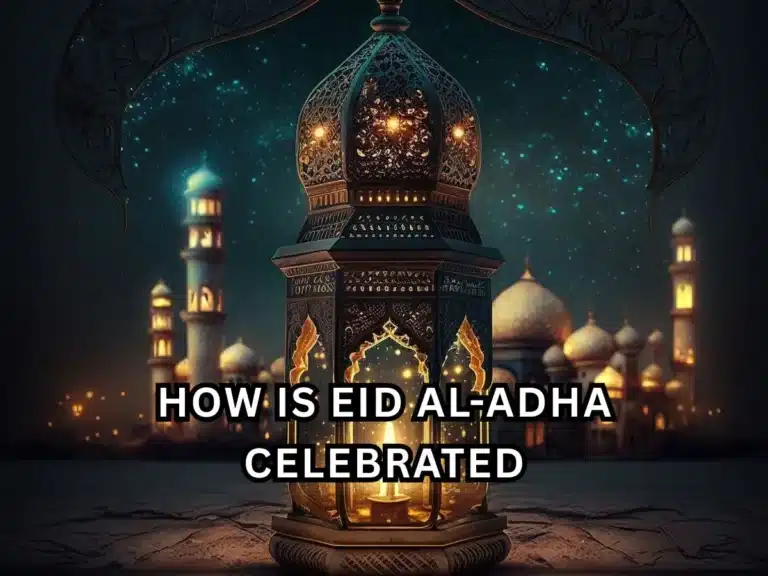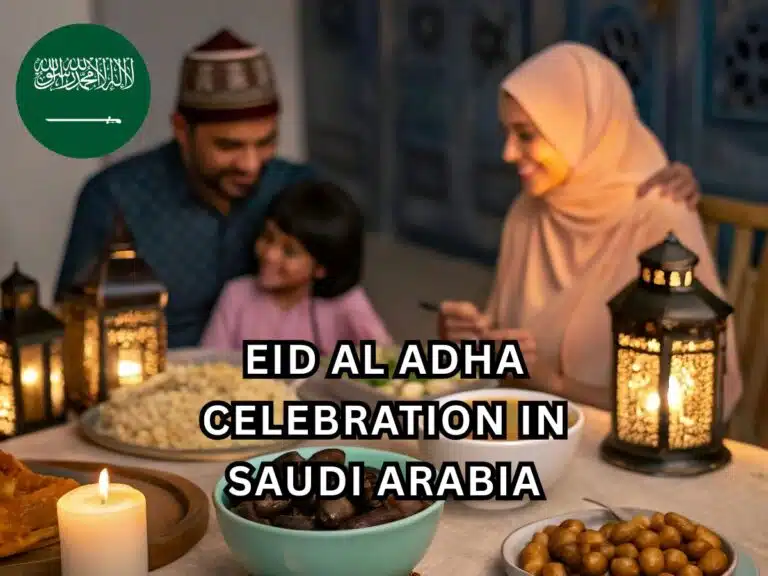Introduction
Festivals bring joy, love, and a deep sense of connection among people. They remind us of our values and faith. Among the many beautiful celebrations across the world, Eid al Adha stands out with its spiritual meaning and emotional depth. But many still ask, why is Eid al Adha important? It is more than just a religious holiday—it is a lesson in sacrifice, compassion, and unity.
In this blog, we’ll explore everything you need to know about Eid al Adha and truly understand why it holds such a powerful place in the hearts of millions around the world. (Why is Eid al Adha important)
What is Eid al Adha?
Eid al Adha is one of the two main Islamic festivals celebrated by Muslims globally. Often called the “Festival of Sacrifice,” it honors the willingness of Prophet Ibrahim to sacrifice his beloved son as an act of obedience to God. However, God replaced his son with a ram, showing His mercy.
This festival takes place after the annual pilgrimage, Hajj, and is marked by prayers, animal sacrifice, and acts of charity. But to understand why is Eid al Adha important, we must go deeper into its message and meaning.
Eid al Adha teaches obedience, selflessness, and the importance of caring for others. It brings families and communities together and reminds everyone of their blessings. The celebration goes beyond rituals—it touches the soul.
Top Benefits of Eid al Adha
To truly know why is Eid al Adha important, let’s explore the real-world benefits it brings into people’s lives.
1. Strengthens Faith and Obedience
Eid al Adha helps believers reconnect with their faith. The story behind the festival is a lesson in full trust in God’s plan. By commemorating Ibrahim’s devotion, Muslims are reminded to stay committed to their values.
2. Teaches the Value of Sacrifice
Understanding sacrifice is central to grasping why is Eid al Adha important. Sacrificing an animal is symbolic of giving up something valuable for the sake of the greater good. It teaches patience, humility, and generosity.
3. Encourages Charity and Sharing
During Eid al Adha, the meat from the sacrifice is shared among family, friends, and the poor. This act of giving helps reduce hunger and spreads joy. It’s a practical way to support those in need.
4. Builds Stronger Community Bonds
Celebrating together, praying together, and sharing meals brings unity. This festival helps bridge gaps between people and builds love and trust in communities.
5. Promotes Gratitude
Reflecting on one’s blessings is a major part of the celebration. Knowing why is Eid al Adha important helps people become more thankful for what they have and encourages them to give back.

How to Celebrate Eid al Adha Step-by-Step
Celebrating Eid al Adha is both spiritual and joyful. If you’re new to it, here’s a simple guide to follow:
Step 1: Prepare Ahead
Before Eid arrives, clean your home, buy new clothes, and arrange for the sacrificial animal. Many also give to charity before the day as a spiritual preparation.
Step 2: Attend the Eid Prayer
On Eid morning, Muslims dress in their best clothes and attend a special congregational prayer. The prayer includes a short sermon and is held in mosques or open grounds.
Step 3: Perform the Sacrifice
The sacrifice of a sheep, goat, cow, or camel is carried out as a key ritual. This act is done to remember Prophet Ibrahim’s story and to show gratitude to God. Understanding this act helps answer why is Eid al Adha important.
Step 4: Distribute the Meat
The meat is divided into three parts—one for the family, one for relatives and friends, and one for the poor. This ensures everyone can enjoy the celebration, regardless of wealth.
Step 5: Celebrate with Family
Gatherings, meals, laughter, and prayers fill the rest of the day. Some visit relatives, while others host guests. It’s a time of togetherness and peace.
Common Mistakes to Avoid
Knowing why is Eid al Adha important also means avoiding mistakes that take away from its true meaning.
1. Forgetting the Spiritual Aspect
Many focus only on the feast and forget the festival’s core values—sacrifice, faith, and charity. This weakens the impact of the celebration.
2. Wasting Food
A lot of meat is prepared, and sometimes, not all is used wisely. Eid is about sharing and respecting food, not wasting it.
3. Not Giving to the Poor
One-third of the meat is meant for the needy. Ignoring this part defeats the purpose of the festival. It’s important to include the poor in the joy.
4. Making It Only a Social Event
Eid al Adha should not become just another party. It’s a deep reminder of values. Keeping this in mind helps people understand why is Eid al Adha important.
5. Neglecting Cleanliness
Whether it’s the sacrifice or the gathering, cleanliness must be maintained. Hygiene reflects respect for others and the environment.

Smart Tips and Tricks
Here are some lesser-known tips that make the Eid experience more meaningful and smooth.
1. Plan Meat Distribution in Advance
Make a list of people who should receive a share. This avoids confusion and ensures fair sharing.
2. Donate to Trusted Charities
If you can’t perform the sacrifice yourself, donate to reliable organizations that do it on your behalf. It’s a good alternative while still honoring the festival.
3. Involve Children
Teach kids the story behind Eid al Adha. Let them help pack meat, set the table, or visit neighbors. It builds awareness from a young age.
4. Cook New Recipes
Try different recipes with the meat. Sharing special dishes adds more fun and helps avoid food waste.
5. Use Eco-Friendly Packaging
If distributing meat, use biodegradable bags. It shows love for the environment too.
6. Celebrate with Non-Muslim Friends
Inviting non-Muslims and explaining the festival spreads understanding and respect. It builds bridges across cultures.
Real-Life Relevance
Understanding why is Eid al Adha important becomes clearer when we look at its role in real life.
In a world that often feels divided, this festival teaches unity. It brings families closer, helps the poor, and reminds people to be grateful. A small sacrifice leads to big changes in how people see life and each other.
For many people, Eid al Adha is a moment to reset. It clears the heart, softens egos, and invites kindness. Even children learn valuable lessons in sharing and love. These values are not just for one day—they shape character for life.
And in a global context, this celebration connects millions. It’s a moment where differences fade, and hearts come together. That’s a major reason why is Eid al Adha important in today’s world.
At Interclever, we believe in sharing cultural knowledge that builds empathy and human connection. This festival is a strong example of how traditions can bring light into people’s lives. (Why is Eid al Adha important)

Conclusion
Now you can truly see why is Eid al Adha important. It’s more than a festival—it’s a powerful reminder of love, sacrifice, and compassion. It’s a day where faith meets action, and people are called to give, care, and connect.
Whether you celebrate it or not, the lessons of Eid al Adha are universal. It teaches us to be better humans, to serve others, and to never forget the value of gratitude.
As the world keeps changing, such timeless values are more needed than ever. So next time you hear about Eid al Adha, you’ll know the answer to the question—why is Eid al Adha important?
Frequently Asked Questions About Why is Eid al Adha Important
What does Eid al-Adha mean?
Eid al-Adha means the Festival of Sacrifice. It honors Prophet Ibrahim’s devotion and his willingness to sacrifice his son for God.
Why do Muslims sacrifice animals on Eid al-Adha?
It represents obedience and gratitude to God. The meat is shared to ensure everyone, including the poor, enjoys the festival.
Is Eid al-Adha more important than Eid al-Fitr?
Both are important, but Eid al-Adha is often considered more spiritually significant because of its connection to Hajj and sacrifice.
Can I celebrate Eid al-Adha without sacrificing an animal?
Yes, especially if you’re unable to. You can donate to charity or arrange a Qurbani through trusted organizations.
What should I wear on Eid al-Adha?
Wearing clean, modest, and festive clothes is encouraged. It’s a way to show respect and joy during the celebration.
How long does Eid al-Adha last?
It typically lasts three days, during which prayers, Qurbani, and celebrations take place with loved ones.












